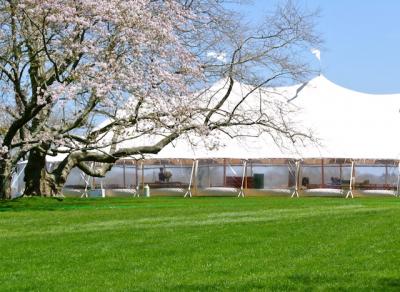Large Parties and Styrofoam Are Targets

Can East Hampton Village enact its proposed law regulating large events without ruining the plans of couples who already have booked venues for weddings? That question was the focus of the village board’s work session last Thursday, while it also discussed a village-wide ban on Styrofoam and a proposal to install a device on the roof of the pavilion at Main Beach designed to free radio frequencies for use by the Navy.
Under the proposed law requiring permits for events with 50 or more people, village hostelries, such as the Hedges Inn and the Maidstone Hotel, which are nonconforming businesses in a residential district, would be prohibited from holding events outdoors or in a tent. The dilemma for board members was how exactly to define the term “already booked.”
“I’ve thought a lot about it,” said Linda Riley, the village attorney, who seemed dubious about the proposal. “I don’t know how we determine what’s truly booked or not. There’s a lot of wiggle room in ‘booked,’ ” she said. Mayor Paul F. Rickenbach Jr., however, seemed intent on finding a way to keep nuptials on track, at least until a specific date in the future. “I think we can make an exception with a time frame,” he said.
Becky Molinaro Hansen, the village administrator, explained that some tweaks had been made to the proposed law since its introduction last month. Language has been added to make it clear that locations open to the public, such as churches, museums, and libraries, would not be prohibited from having large gatherings either indoors or outdoors.
The law’s definition of a charitable organization was revised to include political committees and charities based outside the village as eligible to apply for a permit.
The proposed law makes a distinction between the terms social occasion and special event. According to Ms. Hansen, a social occasion is defined as a commonplace event, such as a birthday party, which would be likely to take place at a private residence. A special event is a gathering that is not part of the normal course of business, whether at a residence or a commercial property. Although both social occasions and special events with 50 or more people would require permits, the fees for them might differ.
The language was also changed to make it clear that security deposits and liability insurance would be mandated only for events on village property. Homeowners who hold parties at residences would still be required to reimburse the village for the cost of any public services, such as additional traffic control, that the village deemed necessary.
Moving on to an environmental concern, the board appeared eager to enact a law to prohibit the use or sale of Styrofoam. Last month, the Village of Patchogue banned Styrofoam takeout containers and packing peanuts. The members of the East Hampton
The village board apparently wanted to go further by adding Styrofoam coolers to the list. “A cheap Styrofoam cooler ends up in the landfill a lot quicker than a nice one does,” Arthur Graham, a village trustee, said.
The board also turned its attention to a proposal from Federated Wireless, a mobile communications company, and its business partners, to install a device with “environmental sensing capability.” The sensor would detect when it was necessary to free federal cellular frequencies for use by the Navy during land or sea operations. Commercial users would then be directed to other wireless bands.
According to the proposal, such sensors are being installed every 20 to 25 miles across all of the country’s coastlines. After requesting that the design review board sign off on the installation, since Main Beach is located in the Ocean Avenue Historic District, the board agreed to allow the installation.
